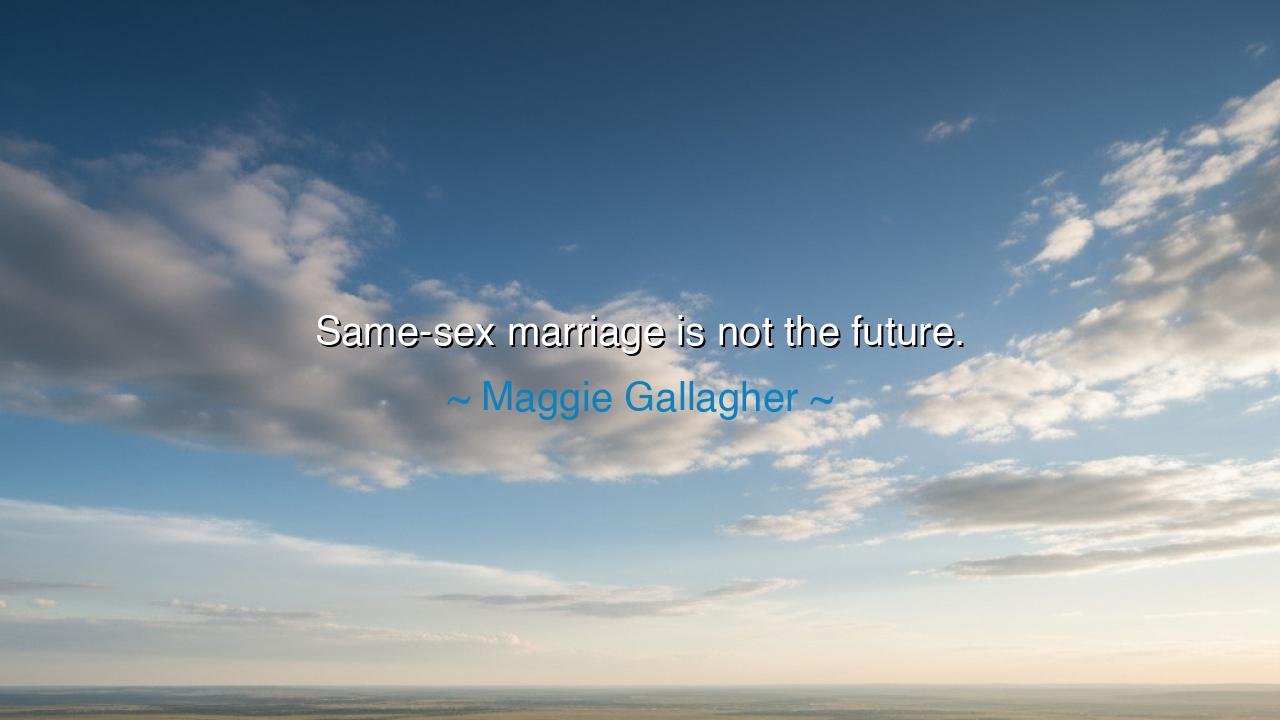
Same-sex marriage is not the future.






In the vast and storied journey of humanity, we have seen countless battles fought over the sacred institution of marriage. It has long been considered the foundation of society, the bond that unites two souls in purpose, creates families, and nurtures the future. Yet, the words of Maggie Gallagher—"Same-sex marriage is not the future"—have stirred the hearts and minds of many, sparking fierce debates about the true nature of marriage and its role in the world. These words, though filled with conviction, are but a moment in the ongoing struggle to understand what marriage truly means and who it is for.
At the heart of Gallagher’s statement lies a belief that the traditional union between a man and a woman is the sole and rightful form of marriage, a bond that has stood for centuries as the cornerstone of society. The structure of this union, she suggests, is part of a larger natural order—an order that cannot be easily changed or redefined. There is, in her view, a deep wisdom in the traditional understanding of marriage, one that has existed across cultures and eras. The essence of this union, rooted in procreation, the raising of children, and the natural complementarity of the sexes, is seen as an enduring and sacred institution that must not be altered.
Yet, to see only through the lens of tradition is to risk missing the larger picture of love and human connection. As the world evolves, so too does the understanding of marriage and the bonds that hold us together. Across time, we have seen many transformations in how we view union—from arranged marriages to love-based unions, from political alliances to emotional partnerships. One cannot ignore the story of Alexander the Great, who, despite his great conquests and his deeply held beliefs in the sanctity of tradition, formed close emotional bonds with both men and women. He, too, recognized that the heart of union lies not in gender but in love, in shared purpose, and in mutual respect.
Consider also the modern-day fight for equality for same-sex couples, a movement that has gained incredible momentum in recent years. In places across the world, from the United States to Ireland, the fight for same-sex marriage has become a battle not just for the right to marry, but for the recognition of love in all its forms. These unions, though once considered unthinkable by some, have proven to be no less meaningful or legitimate than those between a man and a woman. The love shared between two individuals of the same sex, built on commitment, trust, and mutual support, mirrors that of any traditional union. And it is in this recognition of shared humanity, not in the framework of gender, that the future of marriage can be found.
The lesson here, my friends, is not one of division, but of understanding. The institution of marriage is not bound to a single form or definition, but rather, it is an expression of love and commitment, the heart of which transcends the boundaries of gender. Maggie Gallagher’s words reflect a view that has deep roots in history, but they must be considered alongside the realities of modern life, where love knows no gender and equality is the standard to which all people should aspire. To suggest that same-sex marriage is not the future is to ignore the progress humanity has made in recognizing the inherent worth and dignity of all people, regardless of whom they choose to love.
As we move forward, let us not see this as a battle of opposites, but as a journey toward a more inclusive and compassionate world. We must learn to honor and celebrate the diversity of love that exists among us, and to ensure that all people, regardless of their sexual orientation, have the same rights and privileges as any other. The future of marriage does not lie in the perpetuation of an exclusive tradition, but in its expansion—in opening the gates wide to allow love in all its forms to flourish.
In your own life, remember this: Love is the foundation of all human connection, and commitment is its highest expression. Whether you form your union through the traditional bonds of a man and a woman, or through a union between two people of the same sex, what matters is not the gender, but the depth of connection, the strength of the bond, and the shared vision of a life together. Let us not be afraid to redefine the institutions that serve us, for the future of humanity will always be shaped by our willingness to evolve, to adapt, and to recognize that love, in all its forms, is sacred and worth celebrating.






AAdministratorAdministrator
Welcome, honored guests. Please leave a comment, we will respond soon